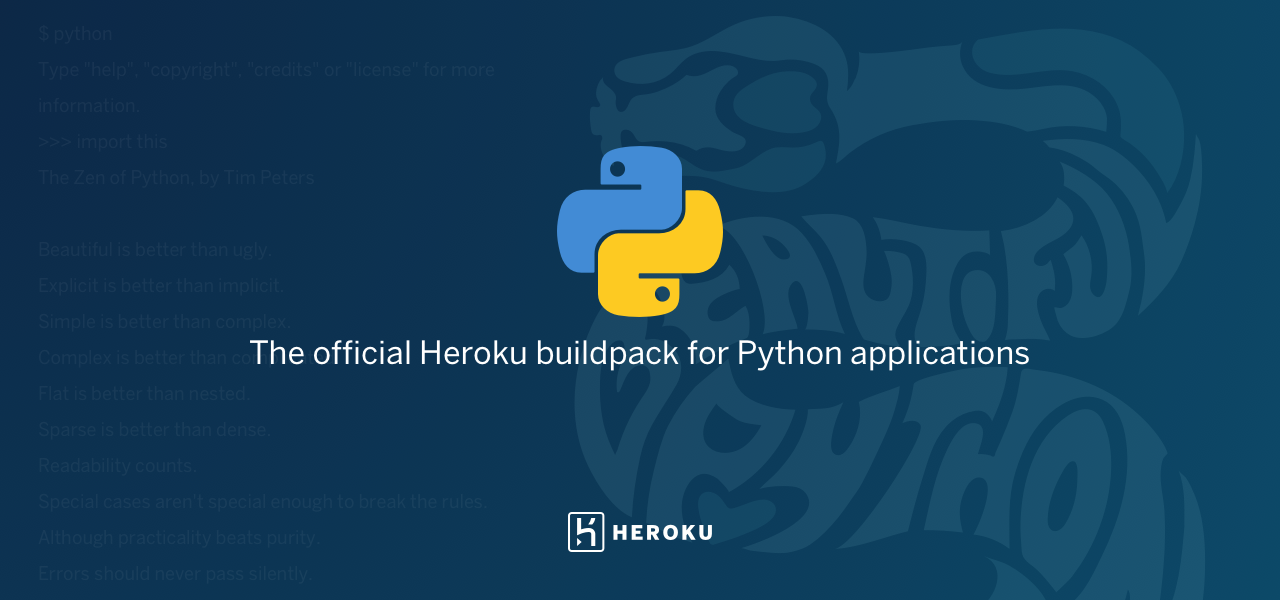https://github.com/heroku/heroku-buildpack-python
Heroku's classic buildpack for Python applications.
https://github.com/heroku/heroku-buildpack-python
buildpack heroku heroku-languages python
Last synced: 8 days ago
JSON representation
Heroku's classic buildpack for Python applications.
- Host: GitHub
- URL: https://github.com/heroku/heroku-buildpack-python
- Owner: heroku
- License: mit
- Created: 2011-05-17T20:26:30.000Z (almost 15 years ago)
- Default Branch: main
- Last Pushed: 2026-02-04T13:32:40.000Z (14 days ago)
- Last Synced: 2026-02-04T23:34:52.507Z (13 days ago)
- Topics: buildpack, heroku, heroku-languages, python
- Language: Ruby
- Homepage: https://devcenter.heroku.com/categories/python-support
- Size: 55.9 MB
- Stars: 989
- Watchers: 118
- Forks: 1,825
- Open Issues: 14
-
Metadata Files:
- Readme: README.md
- Changelog: CHANGELOG.md
- License: LICENSE
- Codeowners: .github/CODEOWNERS
Awesome Lists containing this project
- awesome-cnb - Python
README

# Heroku Buildpack: Python
[](https://github.com/heroku/heroku-buildpack-python/actions/workflows/ci.yml)
This is the official [Heroku buildpack](https://devcenter.heroku.com/articles/buildpacks) for Python apps.
Recommended web frameworks include **Django** and **Flask**, among others. The recommended webserver is **Gunicorn**. There are no restrictions around what software can be used (as long as it's pip-installable). Web processes must bind to `$PORT`, and only the HTTP protocol is permitted for incoming connections.
## Getting Started
See the [Getting Started on Heroku with Python](https://devcenter.heroku.com/articles/getting-started-with-python) tutorial.
## Application Requirements
A `requirements.txt`, `Pipfile.lock`, `poetry.lock`, or `uv.lock` file must be present in the root (top-level)
directory of your app's source code.
When using the package manager [uv](https://docs.astral.sh/uv/) a `.python-version` file is also required.
## Configuration
### Python Version
We recommend that you specify a Python version for your app rather than relying on the buildpack's default Python version.
For example, to request the latest patch release of Python 3.14, create a `.python-version` file in
the root directory of your app containing:
`3.14`
We strongly recommend that you use the major version form instead of pinning to an exact version,
since it will allow your app to receive Python security updates.
The buildpack will look for a Python version in the following places (in descending order of precedence):
1. `runtime.txt` file (deprecated)
2. `.python-version` file (recommended)
3. The `python_full_version` field in the `Pipfile.lock` file
4. The `python_version` field in the `Pipfile.lock` file
If none of those are found, the buildpack will use a default Python version for the first
build of an app, and then subsequent builds of that app will be pinned to that version
unless the build cache is cleared or you request a different version.
The current default Python version is: 3.14
The supported Python versions are:
- Python 3.14
- Python 3.13
- Python 3.12
- Python 3.11
These Python versions are deprecated on Heroku:
- Python 3.10
Python versions older than those listed above are no longer supported, since they have reached
end-of-life [upstream](https://devguide.python.org/versions/#supported-versions).
## Documentation
For more information about using Python on Heroku, see [Dev Center](https://devcenter.heroku.com/categories/python-support).